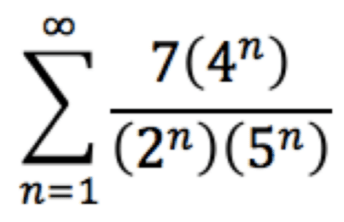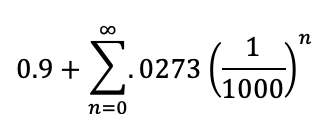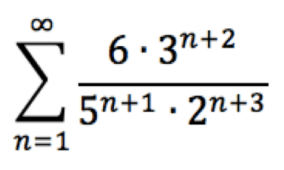sum1/n^2
What is the p-series test?
Find the sum of the series:
10 - 20/3 + 40/9 - 80/27 + ...
What is 6?
What words need to be written any time you apply the integral test?
What are "the series is positive, continuous and decreasing" ?
lim_(n->oo)(-2/5)^n
What is 0?
sum_(n=0)^oo(2/3)^n
What is the series converges by geometric series test ? (|r| = 2/3 < 1)
sum (5^n)/(n!)
What is the ratio test?
Find the sum

What is 14/3 ?
What words need to be written any time you apply the alternating series test or the alternating series remainder theorem?
What is "The terms of the series alternate in sign and decrease in absolute value to 0" ?
lim_(n->oo)(3n)/(n+1
What is 3?
sum_(n=0)^oo(-1)^n2^n/(n!)
What is the series converges by alternating series test ?
(must show the limit and have the statement, "the terms of the series alternate in sign and decrease in absolute value")
sum (2/3)^n
What is the geometric series test?
Write 0.9273273273273273... as a geometric series in sigma notation
What is

There are three tests that prove convergence when the limit value is less than 1 and divergence when the limit value is greater than 1. Name these three tests.
What are the geometric, ratio and root tests?
lim_(n->oo)(2^n)/(n!)
What is 0?
sum_(n=0)^oo(-1)^n(n!)/2^n
What is the series diverges by nth term test ?
(Must show the limit is DNE)
sum (lnn)/n
What is the integral test?
Find the sum (no calculators)

What is 81/140 ?
The terms of a series are:
4 - 8/3 + 4/3 - 8/15 + 8/45 - ...
If the first 3 terms are used to approximate the sum of the series, explain why the error in the approximation must be less than 2/3.
What is:
The terms of the series alternate in sign and decrease in absolute value to 0.
Error ≤ |-8/15| < 2/3 :)
lim_(n->oo)sin((npi)/2)
What is DNE?
sum_(n=0)^oo(n^2-2)/(n^5)
What is the series converges either by direct or limit comparison?
(must either show the inequality or the limit)
sum n/(n^3+5)
What is the direct or limit comparison test?
Write 1.2494949494949494949... as a fully simplified quotient of two integers (no calculators)
What is 1237/990?
If the
lim_(n->∞)|a_n|=0
then the series converges: a) absolutely, b) conditionally or c) cannot be determined with the information given
What is c) cannot be determined with the information given
lim_(n->oo)(1-2/n)^n
What is e-2?
sum_(n=3)^oo(lnn/n)
What is the series diverges by integral test ?
(Must include the statement "the function f(x) = lnx/x is positive, continuous and decreasing" and show the improper integral using correct limit notation)